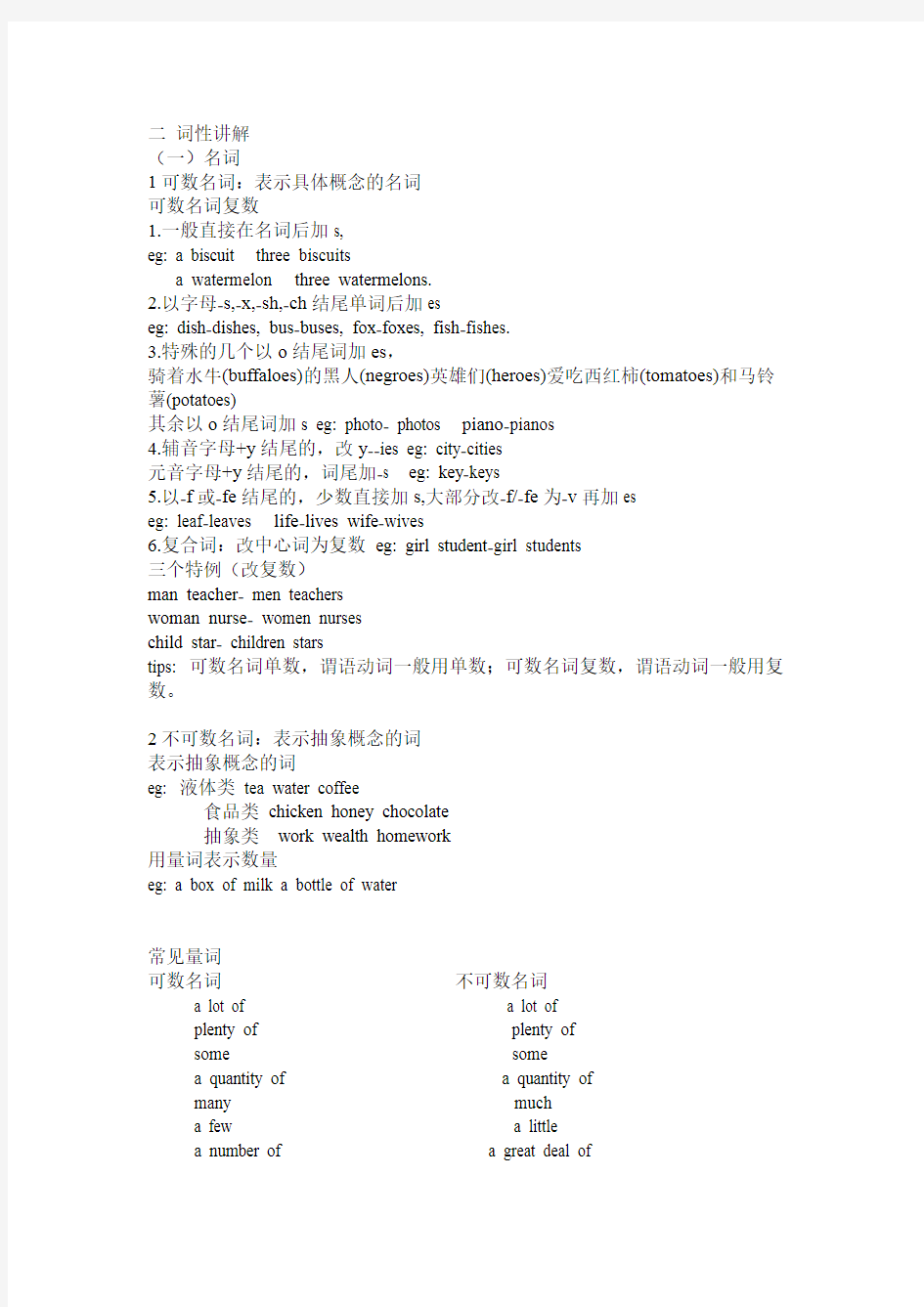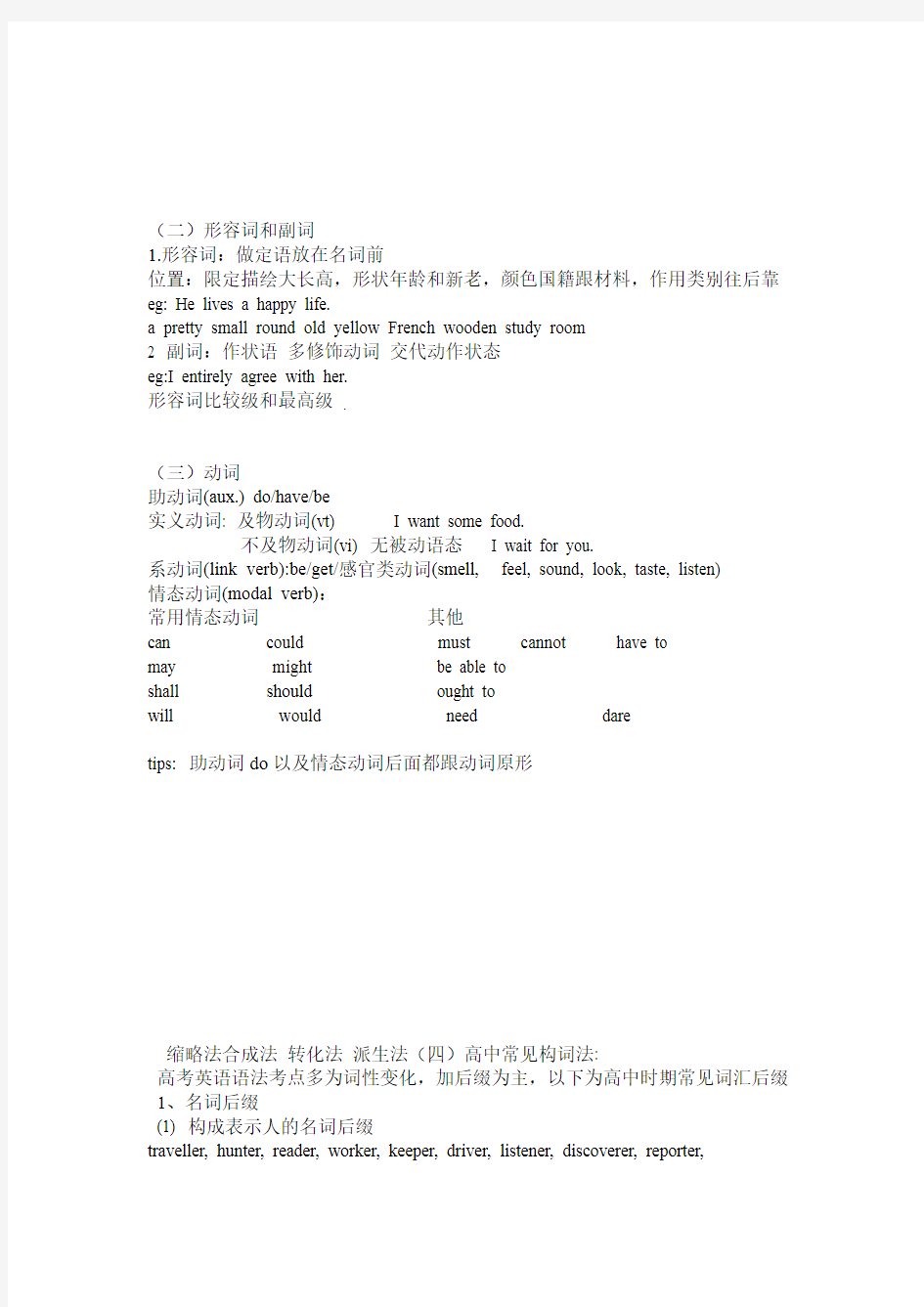高考英语语法之词性


二词性讲解
(一)名词
1可数名词:表示具体概念的名词
可数名词复数
1.一般直接在名词后加s,
eg: a biscuit three biscuits
a watermelon three watermelons.
2.以字母-s,-x,-sh,-ch结尾单词后加es
eg: dish-dishes, bus-buses, fox-foxes, fish-fishes.
3.特殊的几个以o结尾词加es,
骑着水牛(buffaloes)的黑人(negroes)英雄们(heroes)爱吃西红柿(tomatoes)和马铃薯(potatoes)
其余以o结尾词加s eg: photo- photos piano-pianos
4.辅音字母+y结尾的,改y--ies eg: city-cities
元音字母+y结尾的,词尾加-s eg: key-keys
5.以-f或-fe结尾的,少数直接加s,大部分改-f/-fe为-v再加es
eg: leaf-leaves life-lives wife-wives
6.复合词:改中心词为复数eg: girl student-girl students
三个特例(改复数)
man teacher- men teachers
woman nurse- women nurses
child star- children stars
tips: 可数名词单数,谓语动词一般用单数;可数名词复数,谓语动词一般用复数。
2不可数名词:表示抽象概念的词
表示抽象概念的词
eg: 液体类tea water coffee
食品类chicken honey chocolate
抽象类work wealth homework
用量词表示数量
eg: a box of milk a bottle of water
常见量词
可数名词不可数名词
a lot of a lot of
plenty of plenty of
some some
a quantity of a quantity of
many much
a few a little
a number of a great deal of
(二)形容词和副词
1.形容词:做定语放在名词前
位置:限定描绘大长高,形状年龄和新老,颜色国籍跟材料,作用类别往后靠eg: He lives a happy life.
a pretty small round old yellow French wooden study room
2 副词:作状语多修饰动词交代动作状态
eg:I entirely agree with her.
形容词比较级和最高级
(三)动词
助动词(aux.) do/have/be
实义动词: 及物动词(vt) I want some food.
不及物动词(vi) 无被动语态I wait for you.
系动词(link verb):be/get/感官类动词(smell, feel, sound, look, taste, listen)
情态动词(modal verb):
常用情态动词其他
can could must cannot have to
may might be able to
shall should ought to
will would need dare
tips: 助动词do以及情态动词后面都跟动词原形
缩略法合成法转化法派生法(四)高中常见构词法:
高考英语语法考点多为词性变化,加后缀为主,以下为高中时期常见词汇后缀1、名词后缀
(1) 构成表示人的名词后缀
traveller, hunter, reader, worker, keeper, driver, listener, discoverer, reporter,
A.-er/-or/-cian/-ist表示人的:owner, speaker, weaver, winner, buyer, leader, runner, swimmer, ruler, viewer, stranger//
actor, director, inventor, operator, governor, professor, conductor, visitor, sailor// mathematician, physician, politician, musician//
artist, communist, novelist, physicist, violinist, pianist, naturalist, socialist, scientist, typist//
actress, waitress, millionaires, tailoress, tigress
B.-ress 表示女性:Chinese, Japanese, Portuguese, Taiwanese, Cantonese
C.-ese表示人,语言:Italian, American, Australian, Austrian, Canadian, Hungarian, Indian,
D.-an(国名居多)表示国家的人:Russian
构成抽象名词与集合名词的后缀(2)
动词名词后缀有:○1A.-age 表示状态,行为,身份及其结果,总称: package, marriage, carriage, postage, storage,
luggage, baggage, percentage
B.-ure/ 表示行为,结果: failure, pleasure, pressure, mixture, fixture
C.-ment/ 表示物品和物质名称: argument, judgement, achievement, astonishment, development,
excitement, encouragement, movement, government, punishment, treatment, statement, department,
enrichment
D.-ion/sion/ation/action/cation/ition/ 表示行为的过程,结果,状况: education, graduation,
translation, separation, operation, celebration, congratulation, action, invention, attraction, connection,
election, collection, devotion, pollution, decision, division, attention, description, production, reduction,
revision, permission, examination, explanation, consideration, invitation, imagination, pronunciation,
satisfaction, addition, repetition, competition
E .-al/ 表示物品和物质名称: arrival, survival, burial, proposal, disapproval, refusal
F. -ance/ence 表示性质,状况,行为,过程,总量,程度”: appearance, entrance, guidance,
difference, reference, endurance
G. -ing 表示动作的过程,结果:building, feeling, dancing, meeting
形容词名词后缀有:○2A.-ity 表示性质,状态,程度”majority, electricity, activity, equality, possibility, ability
B.-ness 表示性质,状态,程度”kindness, illness, sickness, brightness, selfness, correctness,
happiness, darkness, weakness, carelessness
其他后缀:○3A.形容词/名词/动词+ -ery/-ry 表示工作场所,饲养所,地点bravery, discovery, machinery,
slavery, chemistry
B.形容词/名词+ ship 表示情况,性质,技巧,技能及身份,职业”friendship, leadership, hardship,
citizenship, comradeship, professorship, warship, membership
C. 形容词/名词+dom 表示人和事物的总和,集合wisdom, freedom, kingdom
D形容词/名词+ ism 表示制度,主义,学说,信仰,行为communism, socialism, Marxism,
imperialism
E. 名词+ -hood 表示人和事物的总和,集合boyhood, girlhood, childhood, neighbourhood, manhood
F. 形容词/动词+ -y 表示行为的结果,状态,性质”difficulty, honesty, safety, activity, injury, unity,
wealth,
depth, strength, youth, length, truth, 动作,性质,过程,状态表示-th + 动词/形容词. G.
warmth, width, growth
2、形容词后缀形容词名词○1A. -al/-ical/ ic/ 带有“属性,倾向,相关”的含义traditional, cultural, agricultural, natural, physical,
musical, practical, national, technical, industrial, material, actual, politic, historic, basic, electric, atomic,
automatic, plastic, magic, scientific,
-ish foolish, childish, womanish, Spanish, British, English
B. -ar带有“属性,倾向,相关”regular, particular,
C. -ary带有“属性,倾向,相关”revolutionary, extraordinary, contrary
D. -ly表示“相象,类似”的含义friendly, motherly, brotherly, monthly, weakly, wooly, lovely,
lively, lonely
E. -en表示由某种物质形成,制成或生产的含义:wooden, woolen, golden,
F.-ern 表示方向eastern, western, northern, southern
G. -y 表示相像类似cloudy, sunny, shiny, windy, rainy, snowy, lucky, salty, hilly, funny, healthy, sleepy,
foggy, dusty, lucky, muddy, wealthy, noisy, easy, dirty, thirsty, angry, hungry, smoky, sandy
H. -ous/-ious 表示充分的dangerous, famous, nervous, poisonous, serious, curious, various, mountainous,
humorous
动词形容词带有“属性,倾向,相关”○2-ed excited, learned, tired, interested, surprised, pleased
-ing interesting, moving, exciting, tiring, surprising
-ant/-ent pleasant, constant, excellent,
-ive active, expensive, talkative, comparative, relative
其他(名, 动皆可加):○3名词/动词+ able/ible 表示可以能够valuable, reasonable, comfortable, countable, enjoyable, horrible,
terrible, responsible
名词/动词+ ful表示“充分的”含义careful, powerful, tearful, beautiful, hopeful, wonderful,
fearful, thankful, harmful, useful, frightful
名词/动词+ less表示否定careless, hopeless, useless, harmless, homeless, wireless, endless, selfless,
powerless, fearless, valueless
名词/动词+ some带有“属性,倾向,相关”handsome, troublesome, tiresome 3、副词后缀
形容词+ly:badly, nearly, mostly, quickly, roughly, quietly, silently, sadly, slowly, commonly, softly, ○1frequently, rapidly, deeply, slightly, lightly, fairly, smartly, certainly, excitedly, curiously, firmly,
constantly, seriously, particularly, coldly, suddenly, freely, highly, lately, finely, politely, completely,
widely, immediately, unfortunately, surely, closely, truly, wholly, probably, simply, possibly, impossibly,
terribly, easily, busily, happily, heavily, angrily, prettily, hungrily, shyly, dryly, carefully, finally, usually,
actually, really, naturally, beautifully, dully, fully, scientifically, physically
名词/介词+ward/wards 表示方向:northward, southward, eastward, westward, downward, ○2upward, backward, forward, toward, afterwards
4、动词后缀
A. 名词/形容词+en表示使成为,引起,使有”:deepen, broaden, widen, darken, weaken, sharpen,
blacken, redden, whiten, tighten, strengthen, lengthen, heighten
beautify, satisfy, electrify, purify, terrify
:”使成, 化……使表示fy 形容词+/名词B.
C. 名词/形容词表示做成,变成,……化+ize/ise:realize, modernize, personalize
D. 名词去-ion加上-ate构成示“成为……,处理,作用”:liberate, educate, operate, translate,
graduate, separate, celebrate, congratulate
E. -ish 表示使,令”由外来词构成:finish, publish, astonish
5、数词后缀
A. 基数词+teen:thirteen, fourteen fifteen, sixteen, seventeen, eighteen, nineteen
B. 基数词+ty:twenty, thirty, forty, fifty
C. 基数词+th:fourth, fifth, sixth, eighth, ninth
(五)非谓语动词
不能做谓语的动词
(1)异同
相同点:除了谓语,可以用于句子中的主,宾,表,定,状等其他成分(不讲)
不同点:
从时间上讲:○1to do 带有将来的含义eg: She had no plans to retire from her position. (表将来和主动)
现在分词doing带有正在进行的含义
eg: Not knowing where to go, she goes to the police for help. (表主动和进行,伴随状语)
过去分词done带有完成的含义eg: Written in a hurry, this article was not good. (表完成)
从主语和动作的关系上讲:○2to do/doing 表示主动例句同上
done 表示被动eg: Given another hour, I can also work out this problem (表被动). 从非谓语动词和句子本身的关系来讲○3to do 表示目的,结果等
You don't have to run fast or for long to see the benefit. (表目的)
doing/done表示伴随eg: The teacher came into the lab, followed by some students.
Some students came into the lab, following the teacher.
动名词doing是名词,表示习惯性动作,作主语居多,句型:doing …+ V ○4to do不定式做主语可以表示具体的动作
eg: Playing with fire is dangerous. (playing泛指玩火)
To play with fire will be dangerous. (To play指玩火这个动作会发生危险)
doing的固定搭配(2)动词后面跟to do 不定式和Verbs+ to do
(decide, determine, learn, want, expect, hope, wish, refuse, manage, care, pretend, offer, promise, choose,
plan, agree, ask, beg, help) + to do
Verbs + doing
(suggest, look forward to, excuse, pardon, admit, delay, put off, fancy, avoid, miss, keep, keep on, practice,
t help, mind, escape) deny, finish, enjoy, appreciate, imagine, risk, can'
Verbs + to do/doing 都可to do sth 忘记要做某事forget
doing sth 忘记做了某事
to do sth 记得要做某事
remember
doing sth 记得做了某事
to do sth 停下来做某事
stop
doing sth 停止做某事
to do sth 很遗憾要做某事
regret
doing sth 后悔做过某事
to do sth 努力做某事
try
doing sth 试着做某事
to do sth 打算做某事
mean
doing sth 意味着做某事
sb to do sth
allow/permit/forbid/advise/consider
doing sth
(六)冠词
不定冠词 a an 一个
a用于辅音音素前a cup, a book
an用于元音音素前an apple, an engineer an hour
定冠词the 和名词连用表示特指
eg: Take the medicine. the sun the first
零冠词(不加冠词)
1.国名,人名前不加冠词eg: China Bob
2.表示一类人或事物的泛指的复数名词,不加冠词
eg: They are teachers
3.抽象名词表示一般概念,不加冠词
eg: Failure is the mother of success.
4.物质名词表示一般概念时通常不加冠词
eg: Man can not live without water.
5.季节,月份,节日,假日,日期,星期等表示时间的名词不加冠词eg: Monday in April
6.表示称呼,官衔,职位名词前不加冠词
eg: General Lee, uncle Sam
7.三餐,球类运动,娱乐运动名词前不加冠词
eg: have breakfast, paly chess, play basketball
8.当两个或两个以上名词连用时,常省略冠词
eg:I can't write without pen or pencil.
9,by后加交通工具,中间不用冠词
eg: by bus, by train
10.某些个体名词不用冠词,表示深层含义: school, college, prison, market, hospital, bed, class, town,
church, court etc.
eg: go to school 去上学go to hospital 住院
go to the school 去学校go to the hospital 去医院
11.序数词前不加冠词:
a 序数词前有物主代词eg: my first mobile phone
b 序数词作副词eg: He came first in the race.
c 固定词组eg: at first, first of all
(七)代词
